Infocom was an American software company based in Cambridge, Massachusetts, that produced numerous works of interactive fiction. They also produced a business application, a relational database called Cornerstone.
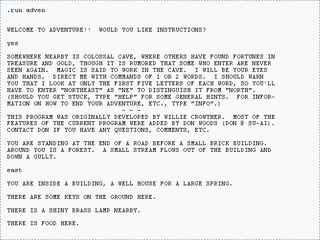
Interactive fiction, often abbreviated IF, is software simulating environments in which players use text commands to control characters and influence the environment. Works in this form can be understood as literary narratives, either in the form of interactive narratives or interactive narrations. These works can also be understood as a form of video game, either in the form of an adventure game or role-playing game. In common usage, the term refers to text adventures, a type of adventure game where the entire interface can be "text-only", however, graphic text adventures still fall under the text adventure category if the main way to interact with the game is by typing text. Some users of the term distinguish between interactive fiction, known as "Puzzle-free", that focuses on narrative, and "text adventures" that focus on puzzles.

Steven Eric Meretzky is an American video game developer. He is best known for creating Infocom games in the early 1980s, including collaborating with author Douglas Adams on the interactive fiction version of The Hitchhiker's Guide to the Galaxy, one of the first games to be certified "platinum" by the Software Publishers Association. Later, he created the Spellcasting trilogy, the flagship adventure series of Legend Entertainment. He has been involved in almost every aspect of game development, from design to production to quality assurance and box design.
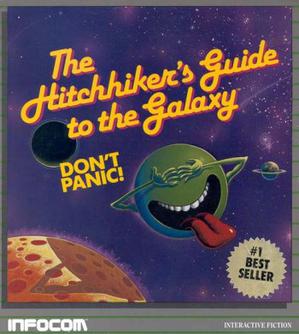
The Hitchhiker's Guide to the Galaxy is an interactive fiction video game based on the comedic science fiction series of the same name. It was designed by series creator Douglas Adams and Infocom's Steve Meretzky, and it was first released in 1984 for the Apple II, Macintosh, Commodore 64, CP/M, MS-DOS, Amiga, Atari 8-bit family, and Atari ST. It is Infocom's fourteenth game.
Legend Entertainment Company was an American developer and publisher of computer games, best known for creating adventure titles throughout the 1990s. The company was founded by Bob Bates and Mike Verdu, both veterans of the interactive fiction studio Infocom that shut down in 1989. Legend's first two games, Spellcasting 101: Sorcerers Get All the Girls and Timequest, had strong sales that sustained the company. Legend also profited from negotiating licenses to popular book series, allowing them to create notable game adaptations such as Companions of Xanth and Gateway. Legend also earned a reputation for comedic adventures, with numerous awards for Eric the Unready in 1993. As the technology of the game industry changed, Legend continued to expand its game engine to take advantage of higher graphical fidelity, mouse support, and the increased media storage of the compact disc.

A Mind Forever Voyaging (AMFV) is a 1985 interactive fiction game designed and implemented by Steve Meretzky and published by Infocom. The game was intended as a polemical critique of Ronald Reagan's politics.

Leather Goddesses of Phobos is an interactive fiction video game written by Steve Meretzky and published by Infocom in 1986. It was released for the Amiga, Amstrad CPC, Amstrad PCW, Apple II, Macintosh, Atari 8-bit family, Atari ST, Commodore 64, TI-99/4A and MS-DOS. The game was Infocom's first "sex farce", including selectable gender and "naughtiness"—the latter ranging from "tame" to "lewd". It was one of five top-selling Infocom titles to be re-released in Solid Gold versions. It was Infocom's twenty-first game.

Planetfall is a science fiction themed interactive fiction computer game written by Steve Meretzky, and the eighth title published by Infocom in 1983. The original release included versions for Apple II, Atari 8-bit family, TRS-80, and IBM PC compatibles. The Atari ST and Commodore 64 versions were released in 1985. A version for CP/M was also released. Although Planetfall was Meretzky's first title, it proved one of his most popular works and a best-seller for Infocom; it was one of five top-selling titles to be re-released in Solid Gold versions including in-game hints. Planetfall uses the Z-machine originally developed for the Zork franchise and was added as a bonus to the "Zork Anthology".

Warcraft Adventures: Lord of the Clans is a cancelled graphic adventure game developed by Blizzard Entertainment and Animation Magic from 1996 until 1998. Set in the Warcraft universe after the events of Warcraft II: Beyond the Dark Portal, it followed the orc character Thrall in his quest to reunite his race, then living on reservations and in slavery following its defeat by the human Alliance. Assuming the role of Thrall, the player would have used a point-and-click interface to explore the world, solve puzzles and interact with characters from the wider Warcraft series.
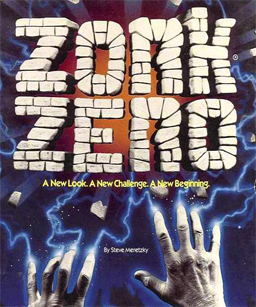
Zork Zero: The Revenge of Megaboz is an interactive fiction computer game, written by Steve Meretzky over nearly 18 months and published by Infocom in 1988. Although it is the ninth and last Zork game released by Infocom before the company's closure, Zork Zero takes place before the previous eight games. Unlike its predecessors, Zork Zero is a vast game, featuring a graphical interface with scene-based colors and borders, an interactive map, menus, an in-game hints system, an interactive Encyclopedia Frobozzica, and playable graphical mini-games. The graphics were created by computer artist James Shook. It is Infocom's thirty-second game.

Sorcerer is an interactive fiction computer game written by Steve Meretzky and released by Infocom in 1984. It is the second game in the magic-themed "Enchanter trilogy", preceded by Enchanter and followed by Spellbreaker. It is Infocom's eleventh game.
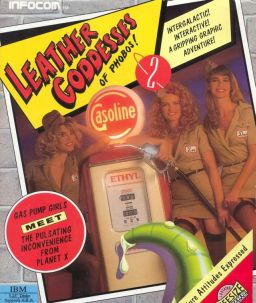
Leather Goddesses of Phobos 2: Gas Pump Girls Meet the Pulsating Inconvenience from Planet X! is a graphic adventure game written by Steve Meretzky and published by Activision in 1992 under the Infocom label. LGOP2 is the sequel to the 1986 interactive fiction game Leather Goddesses of Phobos, also written by Meretzky. LGOP2 featured full-screen graphics and a point-and-click interface instead of Infocom's text parser.

Robert Bates is an American computer game designer. One of the early designers of interactive fiction games, he was co-founder of Challenge, Inc., which created games in the 1980s for the pioneering company Infocom. After Infocom's dissolution in 1989, Bates co-founded Legend Entertainment to continue publishing games in the Infocom tradition, but with added graphics. Notable games that he has designed, written, or produced include Unreal II (2003), Spider-Man 3 (2007), and Eric the Unready (1993), listed as Adventure Game of the Year by Computer Gaming World magazine and also included on the 1996 list of "150 best games of all time". In 1998 he wrote the award-winning game Quandaries for the U.S. Department of Justice. He has twice been the chairperson of the International Game Developers Association, which honored him with a Lifetime Achievement Award in 2010. Bates has written extensively about game design and development in works such as the 2001 book Game Design: The Art and Business of Creating Games, which is commonly used as a game design textbook in college courses. From 2011–2014, Bates was Chief Creative Officer for External Studios at Zynga. He continues to work as an independent consultant with various publishers in the games industry.

Boffo Games was a video game developer founded in 1994 by Steve Meretzky, Mike Dornbrook, and Leo DaCosta. The logo was designed by Gayle Syska, formerly of Infocom. Boffo produced two games, Hodj 'n' Podj and The Space Bar, before closing its doors in 1997. Hodj 'n' Podj was originally designed for Media Vision but it divested all of its multimedia interests following a securities-fraud scandal and the title was purchased by Virgin Interactive. The Space Bar was originally to be published by Rocket Science Games (RSG) but SegaSoft bought out RSG and became the game's publisher.

The Space Bar is a 1997 graphic adventure game developed by Boffo Games and published by Rocket Science Games and SegaSoft. A comic science fiction story, it follows detective Alias Node as he searches for a shapeshifting killer inside The Thirsty Tentacle, a fantastical bar on the planet Armpit VI. The player assumes the role of Alias and uses his Empathy Telepathy power to live out the memories of eight of the bar's patrons, including an immobile plant, an insect with compound eyes and a blind alien who navigates by sound. Gameplay is nonlinear and under a time limit: the player may solve puzzles and gather clues in any order, but must win before the killer escapes the bar.
Classic Text Adventure Masterpieces of Infocom is a collection of 33 computer games from interactive fiction pioneer Infocom, and the top 6 winners of the 1995 Interactive Fiction Competition, released in 1996. All 39 games are combined on a single cross-platform CD-ROM, which also includes PDFs of all the Infocom games' instructions, maps, and hint booklets.
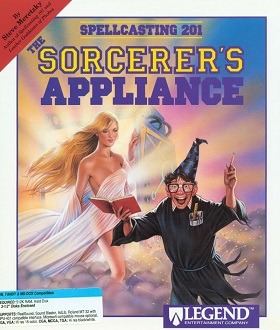
The text adventure game Spellcasting 201: The Sorcerer's Appliance is the second instalment of the Spellcasting series created by Steve Meretzky during his time at Legend Entertainment. All the three games in the series tell the story of young Ernie Eaglebeak, a student at the prestigious Sorcerer University, as he progresses through his studies, learning the arcanes of magic, taking part in student life, occasionally saving the world as he knows it, and having his way with any beautiful women he can get his hands on.

The text adventure game Spellcasting 301: Spring Break is the third and last installment of the Spellcasting series created by Steve Meretzky during his time at Legend Entertainment. All three games in the series tell the story of young Ernie Eaglebeak, a student at the prestigious Sorcerer University, progressing through his studies, learning the arcanes of magic, taking part in student life, occasionally saving the world as he knows it, and having his way with any beautiful women he can get his hands on.
Spellcasting is a series of three interactive fiction games designed by Steve Meretzky during his time with Legend Entertainment. The games feature the character Ernie Eaglebeak, a student at the prestigious Sorcerer University. Spellcasting 101 is the first game created by Legend Entertainment, a hybrid graphical and text adventure format.
Michael Verdu is an American manager and producer and author of computer games.
















